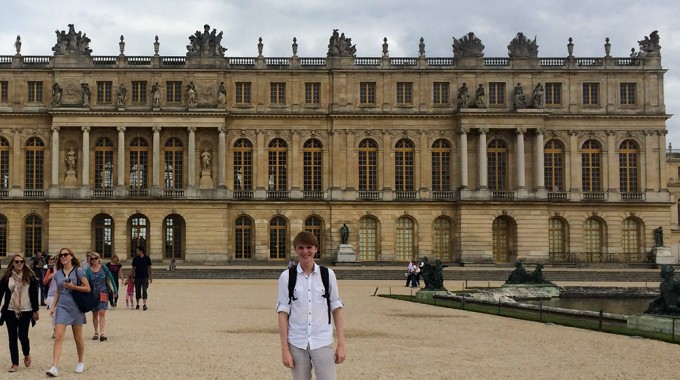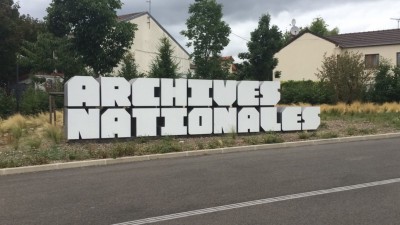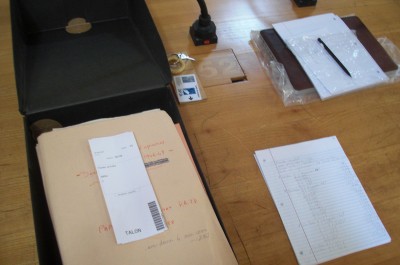If you know of a Columbia College student, faculty member, alumnus/alumna or program we should spotlight, or if you would like to submit a story, please contact:
Columbia College
Office of Communications
cc-comms@columbia.edu

“From my archival experience this summer, afforded to me by the various generous grants and fellowships I received, I’ve been given a chance to contribute my voice to the rapidly evolving narrative of my area of study.” —Wallace Teska CC’16
In the summer of 2015, Wallace Teska CC’16 traveled to France for two months of research at the French Archives nationales. Wallace’s research trip was funded by the Beesen Global Research Fellowship, which was established to provide opportunities for non-native French speakers to study or research in Paris during the summer; Columbia’s European Institute Undergraduate Research Grant, which awards summer fellowships for research, language study or internships in Europe with the aim of encouraging the study of cultural cooperation, public diplomacy and communications; and the Columbia History Department Global Innovation Fund Senior Thesis Fellowship, which is given to undergraduate history majors doing senior theses on European history topics or on topics in other fields using sources from European archives. Here, Wallace reflects on the importance of primary research and the value it holds for his research interests.
The high-pitched screeching of the train rang in my ears as I rode Paris metro line 13 toward Saint-Denis Université on a sweltering day in July, beginning a journey I would repeat day-in, day-out for the next month. I clung to my Monoprix reusable bag containing my laptop, a packet of loose-leaf paper, two non-mechanical pencils and my 2008 Casio digital camera. “No notebooks, no mechanical pencils will be allowed in the archives,” the librarians at Columbia’s Butler Library had warned me before I left New York. After a month of research at other French archives, I began my second month of research in France at a new archive, the Archives nationales, located approximately 45 minutes from my apartment in Paris at Pierrefitte-sur-Seine. Although it was the third archival experience of my summer, I was still on pins and needles to make sure that I didn’t break any rules.
 Outside of France’s Archives nationales. Photo: Wallace Teska CC’16
Climbing out of the metro station, I followed the sterile concrete path through the gates of the Archives nationales, following the signs indicating the Salle de Lecteurs — the reading room. After passing through a metal detector and a bag-search, I locked my bag, wallet, keys and phone in a locker. Placing my archive-approved materials in the provided plastic container, I passed through another security checkpoint with my Carte de Lecteur, my reader ID card, in my hand and continued into the reading room to conduct the primary research I needed to complete before the start of the fall term, when I would begin writing my senior thesis.
Outside of France’s Archives nationales. Photo: Wallace Teska CC’16
Climbing out of the metro station, I followed the sterile concrete path through the gates of the Archives nationales, following the signs indicating the Salle de Lecteurs — the reading room. After passing through a metal detector and a bag-search, I locked my bag, wallet, keys and phone in a locker. Placing my archive-approved materials in the provided plastic container, I passed through another security checkpoint with my Carte de Lecteur, my reader ID card, in my hand and continued into the reading room to conduct the primary research I needed to complete before the start of the fall term, when I would begin writing my senior thesis.
The Reading Room of the Archives nationales is quite different from the other two archives I visited earlier in the summer, the Archives nationales d’outre mer (ANOM) and the Archives de l’Assemblée nationale. While ANOM is an expression of 1990s retro cubism with its neon orange façade and wood-covered interior, and the Archives de l’Assemblée nationale is a cramped bureaucratic office in a Cold-War-era high-security government building, the Archives nationales are clearly a product of a more recent era. The windows, enormous diamonds, stretch up to touch a four-story ceiling, allowing light to filter onto solid black tables with attached reading lights. These archives are the largest in France and contain some of the most significant documents of the previous two centuries.
There is something unique about primary source archival research, an element of adventure and discovery unlike anything else. Many of the documents one views are long forgotten, but valuable and worthy of being revived. I had dreamed of pursuing archival research since before arriving at Columbia, having wanted the opportunity to follow my own research interests and write a senior thesis. Going into the summer before my final year at the College, I already knew what I wanted to write my thesis on: colonial terminology and citizenship law, an interest sparked during my first semester at Columbia in a survey course on French history taught by Emmanuelle Saada, associate professor of French and romance philology.
 Wallace’s typical setup while conducting archival research. Photo: Wallace Teska CC’16
The course inspired me to work on issues relating to colonial legal codes and the era of the French Empire, an interest that led me to where I now found myself, at the Archives nationales conducting research on the creation of a law, the 1946 Loi Lamine-Guèye, that I had stumbled upon while researching colonial West Africa during my sophomore year. My objective was to analyze the creation of this law and its place of significance in the unraveling of colonial terminology.
Wallace’s typical setup while conducting archival research. Photo: Wallace Teska CC’16
The course inspired me to work on issues relating to colonial legal codes and the era of the French Empire, an interest that led me to where I now found myself, at the Archives nationales conducting research on the creation of a law, the 1946 Loi Lamine-Guèye, that I had stumbled upon while researching colonial West Africa during my sophomore year. My objective was to analyze the creation of this law and its place of significance in the unraveling of colonial terminology.
Over the course of my time at the Archives nationales, the procedure of getting to the archives and then accessing its holdings became the familiar experience of my daily routine. Each day, after receiving my reserved documents from a librarian behind a counter, I carried my carton back to my desk, gingerly placing it under the reading lamp and untying the tight tan-colored drawstring, the box’s green cardboard edges folding open to reveal decaying papers with crumbling edges, newspaper articles, political brochures and typewriter carbon copies stained with now-purple ink. Nearly every page was like this: long strings of purple words fading into nothingness with the passage of time.
Researching legal history in a language that is not my native tongue was incredibly challenging. As I sifted through documents written using language difficult even for native French speakers, I categorized my findings. There were the predictable documents — debates in the Constituent Assembly, official bill proposals and election statistics — as well as the unanticipated ones — discussions from Commission sessions, personal letters between deputies, the occasional useful telegram or internal ministerial memo. It was these documents that made my long hours of research worthwhile.
The process of creating law is not unilateral; rather, it is a conglomeration of many voices, subject to constant debate and amendment. Without the context of archival documentation, law becomes less dynamic, less contested, more unanimous, more easily accepted. It is only through contextualizing historical actions within a framework of contemporary primary sources that the complexity and true significance of law is revealed. It is the importance of this context that has drawn me to this sort of research.
Many of the documents I viewed in France this summer had been declassified as recently as the late 1990s and early 2000s, and, therefore, have yet to be digitized and catalogued completely online, making my trip to the archives essential to my ability to access this inventory of history. As the contents of these cartons become more easily accessible to the public, the volume of historical debate will inevitably increase. Already, access to these documents has opened new and evolving conversations around these issues; the number of historical accounts surrounding the issue of citizenship in West Africa has exploded in recent years.
My summer in the archives of France gave me my first glimpse into the life of a historian, a career path I have actively pursued for years. Now, in the midst of writing my thesis and reviewing the contributing research that I conducted in the archives this summer, I realize just how special this experience was. Time in the archives is truly living and breathing history. To hold a document so intimately attached to a significant moment in the past is exhilarating. To add my voice to the debate, to uncover information and narratives previously lost — this is the excitement of writing history. The job of a historian is not necessarily to bring the past to life; rather, it is to piece the past together. From my archival experience this summer, afforded to me by the various generous grants and fellowships I received, I’ve been given a chance to contribute my voice to the rapidly evolving narrative of my area of study. I hope my research will add another piece to the historical puzzle.
Wallace Teska CC’16 is majoring in history and additionally studying French, Arabic and German. On campus, he serves as the treasurer and principle saxophone player of the Columbia University Wind Ensemble and is a tour guide with the Undergraduate Recruitment Committee.